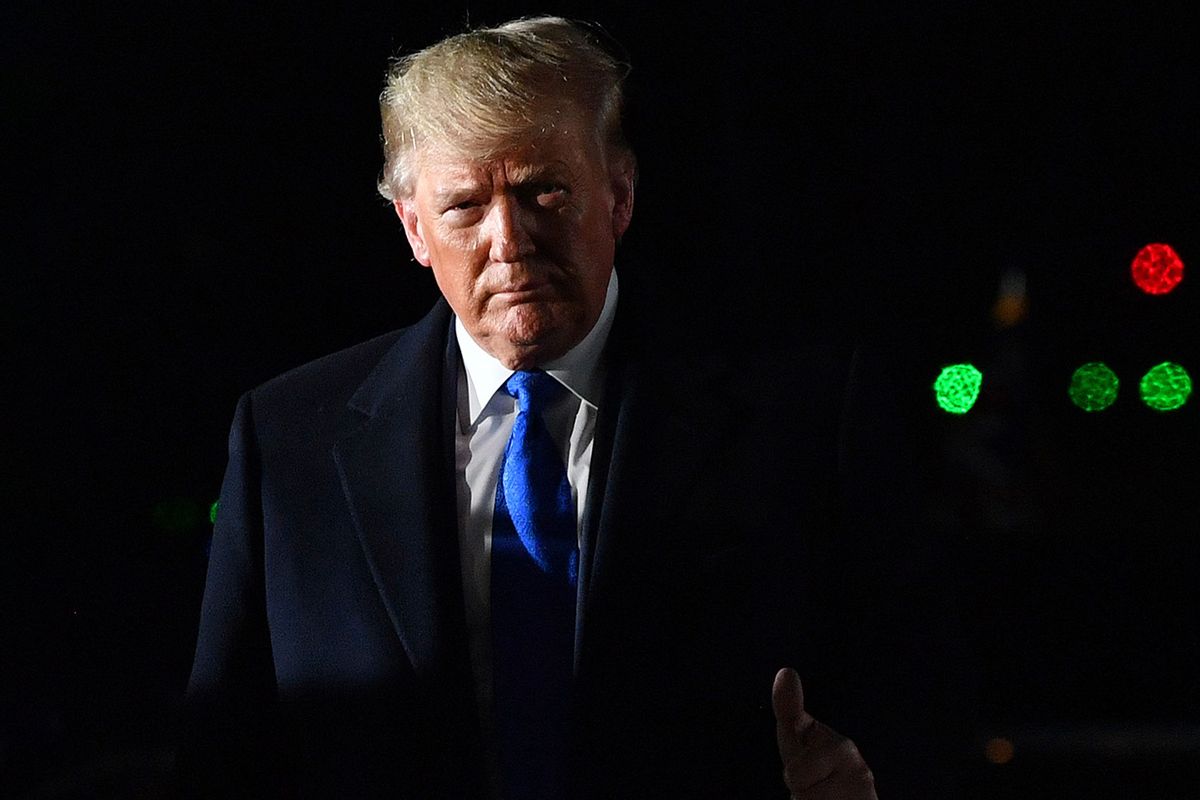The Atlanta-area probe of former President Donald Trump's attempts to overturn his 2020 election loss has expanded to include activities in Washington, D.C. and other states, two sources with knowledge of the investigation told The Washington Post.
The inquiry's expansion is a sign that "prosecutors may be building a sprawling case under Georgia's racketeering laws," the outlet reported.
Fulton Country District Attorney Fani Willis, a Democrat, began her investigation over two years ago into Trump and his allies' efforts to reverse his loss, indicating during its course that she may use the state's far-reaching Racketeer Influenced and Corrupt Organizations (RICO) statute to accuse them of a larger scheme.
Recently, according to the two sources, Willis has pursued information regarding the Trump campaign's hiring of two firms, one of which investigators have subpoenaed, to identify voter fraud across the country and hiding their results when they didn't find it. The DA, whose investigation is separate from a similar federal probe into the former president, has said that she plans to make a charging decision this summer as early as August.
Georgia's RICO statute is one of the nation's most expansive, granting prosecutors the power to build cases around state and federal laws as well as activities carried out in other states. According to the Post, if Willis employs the provision in making her accusations, "the case could test the bounds of the controversial law and make history in the process."
"Georgia's RICO statute is basically two specified criminal acts that have to be part of a pattern of behavior done with the same intent or to achieve a common result or that have distinguishing characteristics," John Malcolm, a Heritage Foundation constitutional scholar and a former Atlanta-based federal prosecutor, told the Post. "That's it. It's very broad. That doesn't mean it's appropriate to charge a former president, but that also doesn't mean she can't do it or won't do it."
Willis' request for information from the firms Trump hired — Simpatico Software Systems and Berkeley Research Group — reaches beyond Georgia to include the other states where the former president contested the election: Arizona, Michigan, Nevada, Pennsylvania and Wisconsin.
It remains unclear whether Willis will pursue indictments for alleged actions people took outside of Georgia. RICO experts say it's unlikely but, the experts explained, the statute's broad net gives the DA the ability to construct a narrative of Trump and his allies' alleged pattern of behavior to reverse the election by bringing in evidence from outside the state and applying other state's laws.
"For example, acts to obstruct justice committed in Arizona might be relevant if the goal of the enterprise, of the racketeering activity, was to overturn the 2020 presidential election nationally, as well as in Georgia," Morgan Cloud, an Emory University law professor and RICO expert, told the outlet.
Cloud added that Georgia prosecutors also bear the burden of proving only two racketeering schemes occurred under the state's RICO law but other information could be used to explain the reach of the alleged scheme.
Willis' investigation has encountered much scrutiny in its attempts to apply state criminal laws to activities related to a federal election and that have resembled constitutionally protected speech, The Post noted. It has also sparked debate, even among those who criticized Trump's actions, about whether prosecution will even be able to prove he and his allies committed crimes in Georgia.
Want a daily wrap-up of all the news and commentary Salon has to offer? Subscribe to our morning newsletter, Crash Course.
Several experts said they believe Willis will draw on possible false statements that Trump, his allies and government officials — which includes Trump lawyers, senior advisors and Georgia Republican leaders — made under the RICO statute.
Norm Eisen, a criminal defense attorney who served as special counsel to the House's first impeachment of Trump, told the Post that, though it's too soon to judge the case, he believes the case is "a strong one."
"Either skepticism or belief is premature because we are not privy to all the evidence that the district attorney has amassed at this point," said Eisen, who is also a senior fellow at the Brookings Institution. "It just depends on the evidence."
Part of Willis' probe revolves around a Jan. 2, 2021, phone call Trump made to Secretary of State Brad Raffensperger, R-Ga., during which Trump said he just wanted "to find 11,780 votes," the exact number he would have needed to beat President Joe Biden.
Though Trump has faced much criticism over the call, legal experts say it does not immediately implicate that he broke the law. Instead, the Post noted, "the comment could be interpreted as the then-president simply spelling out the math that would allow him to reverse Biden's victory."
But Trump's statement during last month's CNN town hall that he called Raffensperger to tell him, "You owe me votes because the election was rigged," could provide Willis with evidence of his intent to solicit Raffensperger to switch votes.
"Subjects of criminal investigation aren't usually reckless enough to go on national television and admit their corrupt intent," constitutional law professor Anthony Michael Kreis, wrote on Twitter after the event. "But Donald Trump just handed Fani Willis a new piece of evidence and tied a bow on it."
As the investigation nears the time period Willis outlined, the nation is waiting to see what evidence she's gathered to prove Trump and his allies' alleged scheme. The next steps —getting the case to trial and successfully arguing the allegations to jurors — could present even more difficult for the district attorney, legal experts say.
"Proving all this beyond a reasonable doubt," Kreis told the Post, "that's going to be the hard part."
Read more
about the Georgia probe

Shares